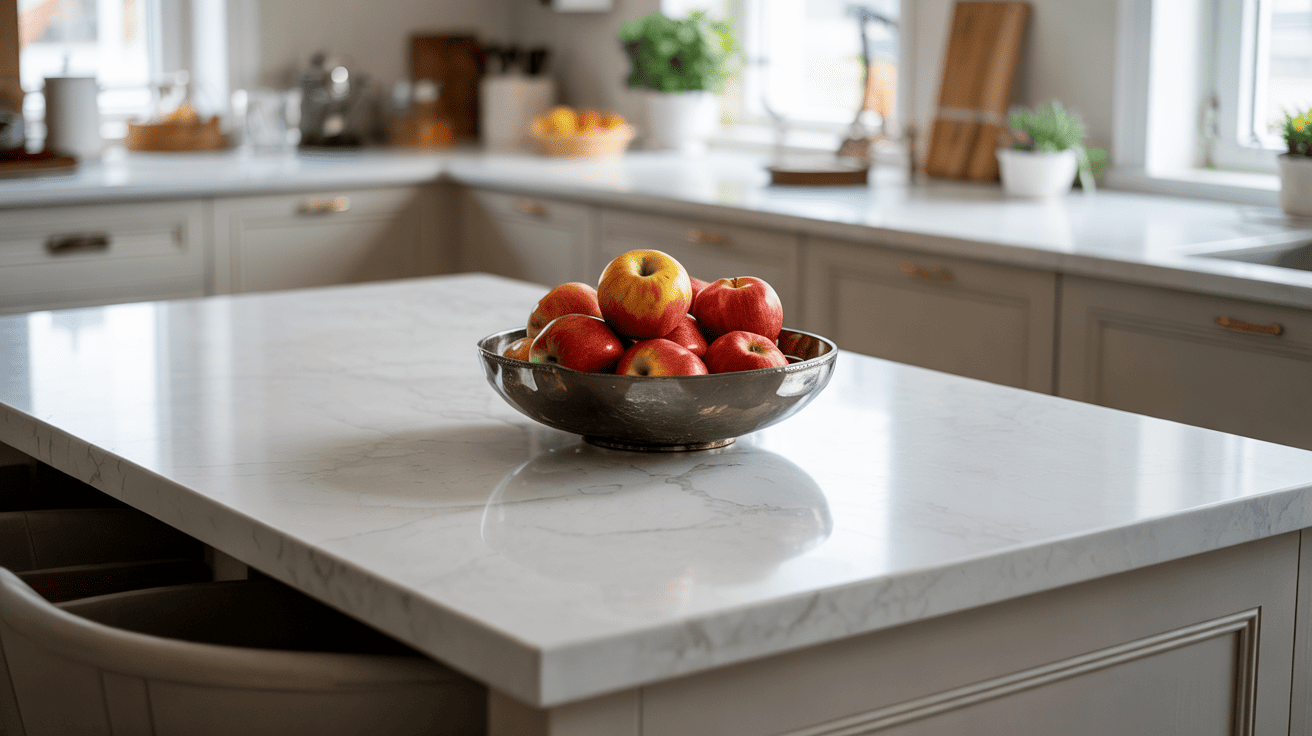Are you tired of countertops that stain easily and require constant maintenance? Non-porous countertops might be the perfect solution for your kitchen or bathroom.
These amazing surfaces don’t absorb liquids, bacteria, or stains like traditional materials do.
Instead of worrying about wine spills or scratches, you can enjoy beautiful countertops that stay clean with just soap and water. From sleek quartz to durable stainless steel, non-porous countertops come in many styles to match any home design.
If you’re building a new kitchen or upgrading your current space, understanding these low-maintenance surfaces will help you make the best choice for your family’s needs.
What are Non-Porous Countertops?
Non-porous countertops are surfaces that don’t have tiny holes or spaces that can absorb liquids, bacteria, or stains. Think of them like a smooth glass window that water rolls right off of, rather than a sponge that soaks everything up.
These countertops are made from materials like quartz, solid surface acrylics, or stainless steel that create a tight, sealed surface.
You can identify non-porous countertops by doing a simple water test – drop some water on the surface, and if it beads up instead of soaking in, it’s non-porous.
Unlike porous materials such as natural granite or wood that need regular sealing to prevent stains and bacterial growth, non-porous countertops stay naturally protected and are much easier to keep clean and sanitary.
Benefits of Non-Porous Countertops
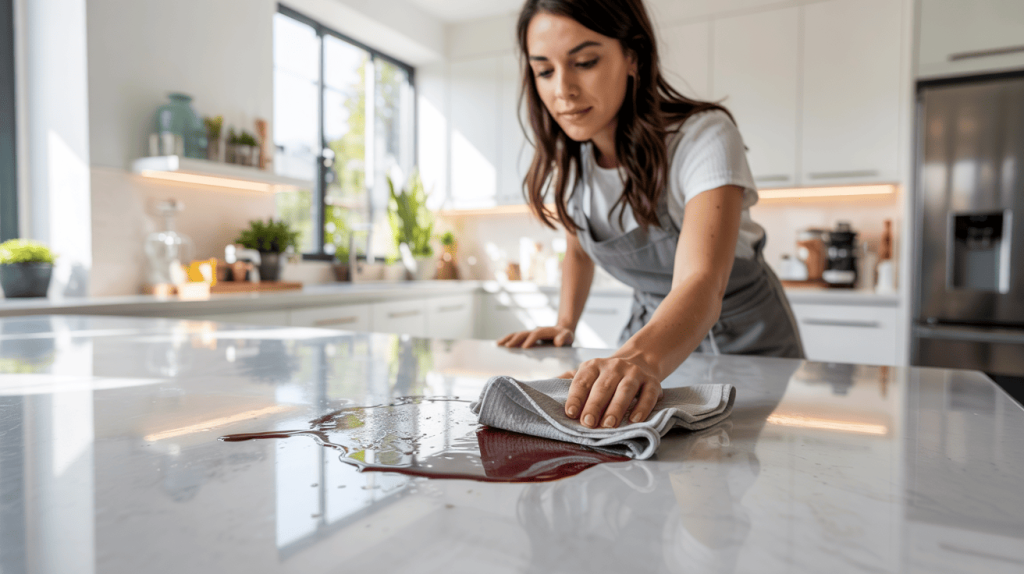
Non-porous countertops offer many advantages that make them a smart choice for any kitchen or bathroom. These benefits make daily life easier and help your countertops last longer while looking great.
- Stays cleaner and healthier – Bacteria can’t hide on the surface since liquids don’t soak in.
- Fights off stains naturally – Spills like wine and oil wipe away easily instead of soaking in.
- Takes less work to maintain – Only needs soap and water, no special cleaners or sealing.
- Lasts longer without damage – Water can’t get inside to cause cracks or weak spots.
- Keeps looking like new – Colors stay bright and surfaces stay smooth over time.
With all these benefits working together, non-porous countertops give you more time to enjoy your kitchen instead of constantly worrying about cleaning and maintenance.
Popular Non-Porous Countertop Materials
There are several excellent non-porous countertop materials to choose from, each with its own special features and benefits. These materials are all designed to resist stains and bacteria while being easy to clean and maintain.
1. Quartz
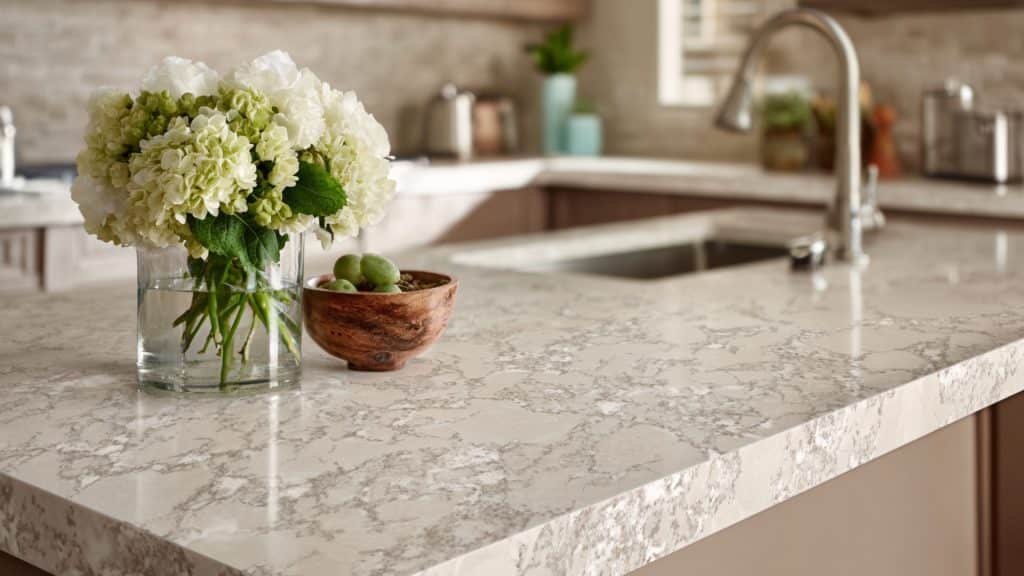
Quartz countertops are made by mixing crushed quartz stone with special resins to create a super-strong surface. They come in many colors and patterns that look the same throughout the entire slab.
Since they’re engineered in factories, you get a consistent appearance without natural stone’s weak spots. Quartz requires minimal maintenance – simply cleaning it with soap and water keeps it looking perfect for years.
2. Solid Surface
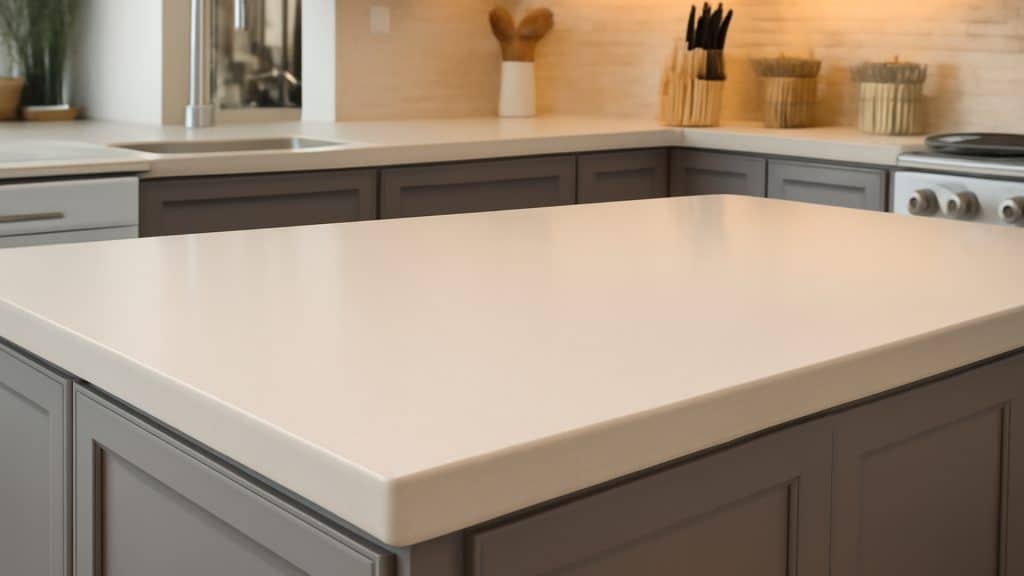
Solid surface materials are made from acrylic or polyester resins mixed with minerals to create a smooth, seamless look. The best part is that if you get scratches or small damages, they can be sanded out and repaired easily.
These countertops can be shaped into curves and joined together without visible seams, giving your kitchen a clean, flowing appearance that’s perfect for modern designs.
3. Stainless Steel
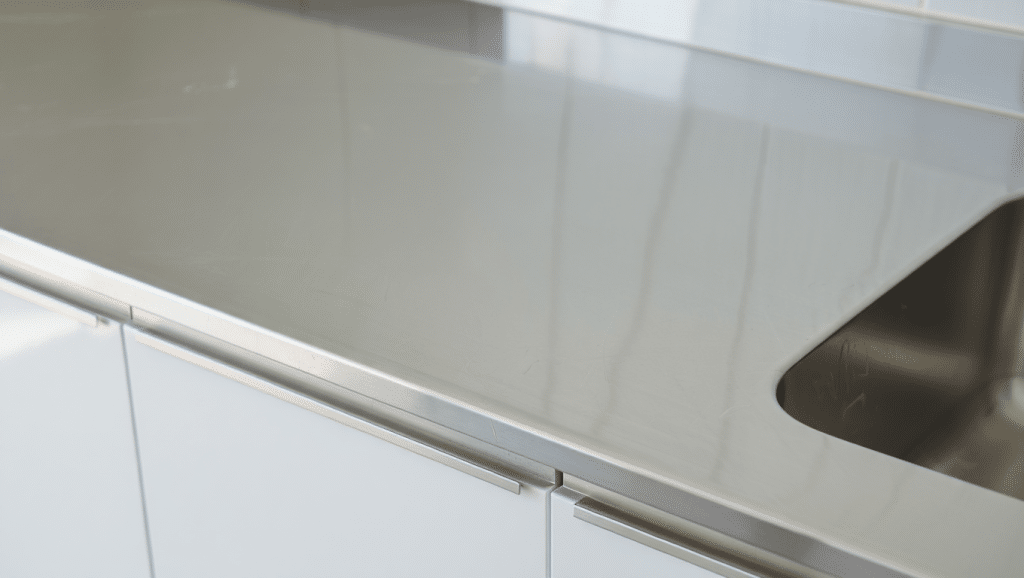
Stainless steel countertops give kitchens a professional restaurant look that many people love. They’re completely non-porous, which means absolutely nothing can soak into the surface.
This makes them incredibly hygienic and perfect for serious cooks. While they can show fingerprints and water spots, they’re easy to clean and will never stain, rust, or harbor bacteria when properly maintained.
4. Recycled Glass Surfaces
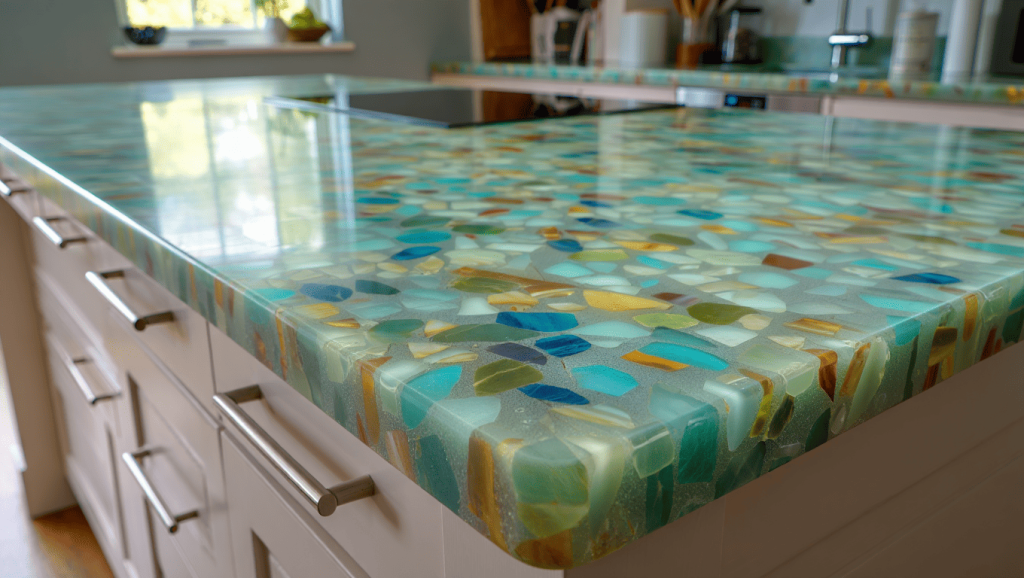
These eco-friendly countertops are made by mixing recycled glass pieces with special binders to create beautiful, colorful surfaces. They’re great for the environment because they use materials that would otherwise go to waste.
The glass pieces create sparkly, unique patterns that catch the light beautifully. As long as they use non-porous binders, these surfaces resist stains and are easy to keep clean.
5. Porcelain Slabs
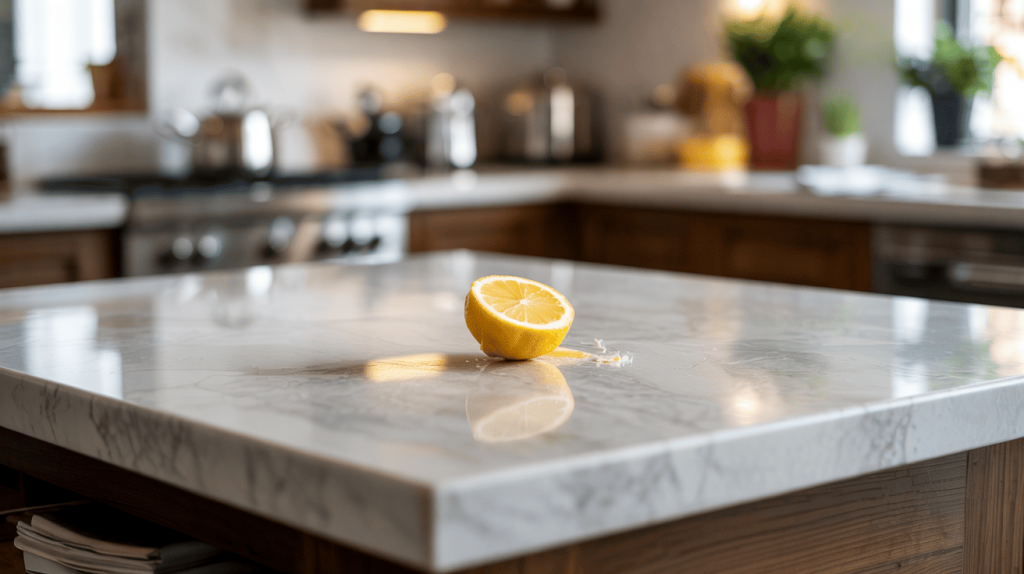
Porcelain countertops are made from clay that’s fired at extremely high temperatures, making them incredibly tough and durable. They won’t fade in sunlight, can handle heat very well, and are completely non-porous.
These slabs can be made to look like natural stone, wood, or other materials while being much stronger and easier to maintain than the real thing.
Non-Porous vs Porous Countertops: Key Differences
Non-porous and porous countertops work very differently when it comes to daily use and maintenance. Understanding these key differences can help you choose the best option for your kitchen and budget.
| FACTOR | NON-POROUS | POROUS |
|---|---|---|
| Stain Resistance | Naturally resistant | Needs sealing |
| Maintenance | Soap and water only | Regular sealing required |
| Bacteria Protection | Naturally hygienic | Can harbor bacteria |
| Initial Cost | Higher | Lower |
| Long-term Cost | No extra expenses | Ongoing sealing costs |
| Cleaning | Easy daily care | More careful cleaning |
Porous materials like granite, marble, concrete, and wood absorb liquids through tiny holes, making sealing essential to prevent stains and bacteria. While porous countertops cost less upfront, ongoing sealing expenses often make non-porous options more economical over time.
Ideal Uses for Non-Porous Countertops
Non-porous countertops work best in areas where cleanliness and durability are most important. These surfaces shine in spaces that deal with food, water, or lots of daily use, where hygiene matters most.
1. Kitchens
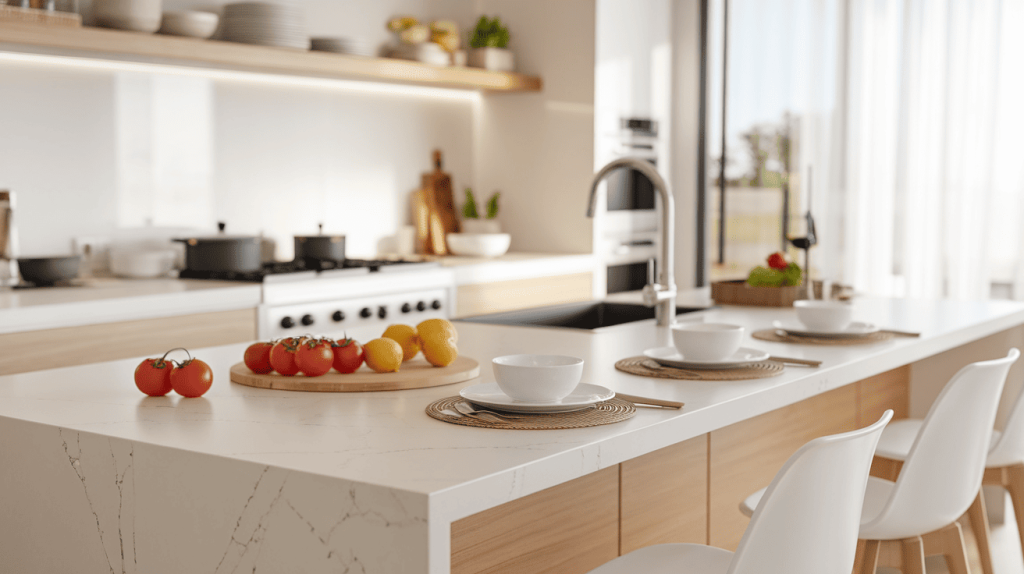
Kitchen countertops face constant challenges from food spills, raw meat juices, and hot pans every day. Non-porous surfaces keep your family safe by preventing harmful bacteria from soaking into the countertop, where you can’t clean it out.
They handle acidic foods like tomatoes and lemons without staining, and you can place hot pots directly on many types without worry about damage.
2. Bathrooms
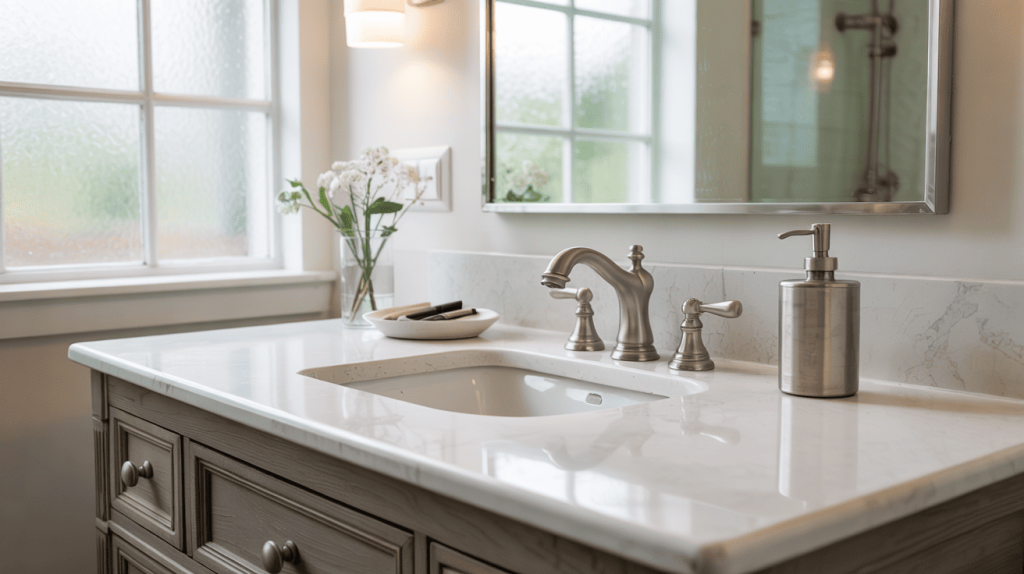
Bathrooms are naturally wet and humid places where mold and bacteria love to grow. Non-porous countertops around sinks and vanities won’t absorb water, soap, toothpaste, or makeup spills that happen daily.
This keeps the surface clean and prevents the musty smells and stains that can develop when moisture gets trapped inside porous materials over time.
3. Commercial Spaces
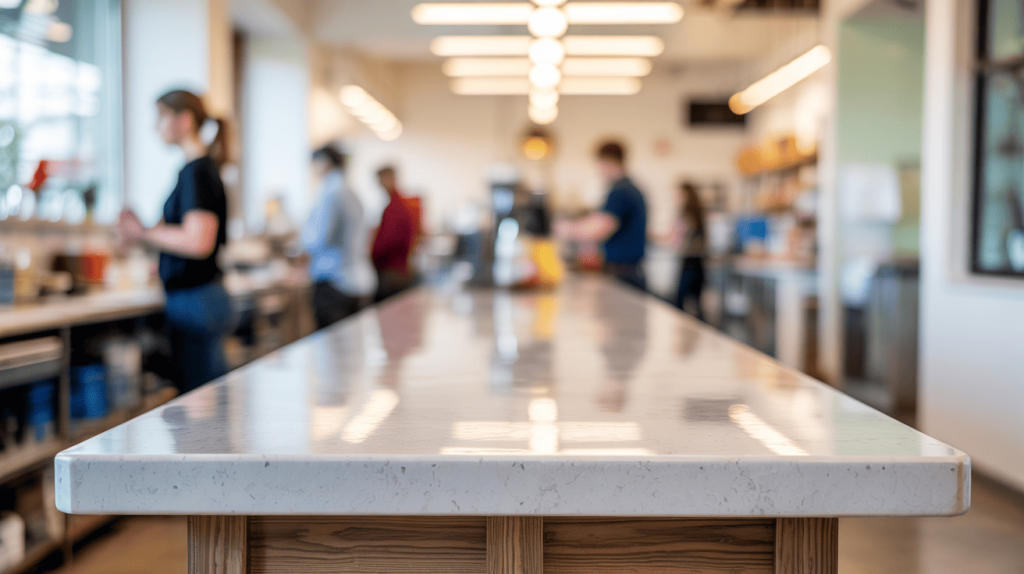
Restaurants, coffee shops, medical offices, and hotels need surfaces that can handle heavy use and meet strict health standards. Non-porous countertops make cleaning fast and thorough, which is essential when serving many customers daily.
They resist stains from coffee, food, and cleaning products while maintaining a professional appearance that looks good for years without expensive repairs.
Cost and Installation Considerations
Non-porous countertops cost more upfront, with quartz ranging from $50-100 per square foot, solid surface around $40-80, and stainless steel between $70-150.
Professional installation is strongly recommended since these materials need precise cutting and fitting, especially around sinks.
While DIY may seem cheaper, mistakes can void warranties and lead to additional costs later. The investment pays off since these countertops last 15-25 years with minimal maintenance, compared to porous surfaces needing regular sealing.
When you consider saved maintenance costs and increased home value, non-porous countertops often provide better return on investment despite higher initial costs.
Care and Maintenance Tips
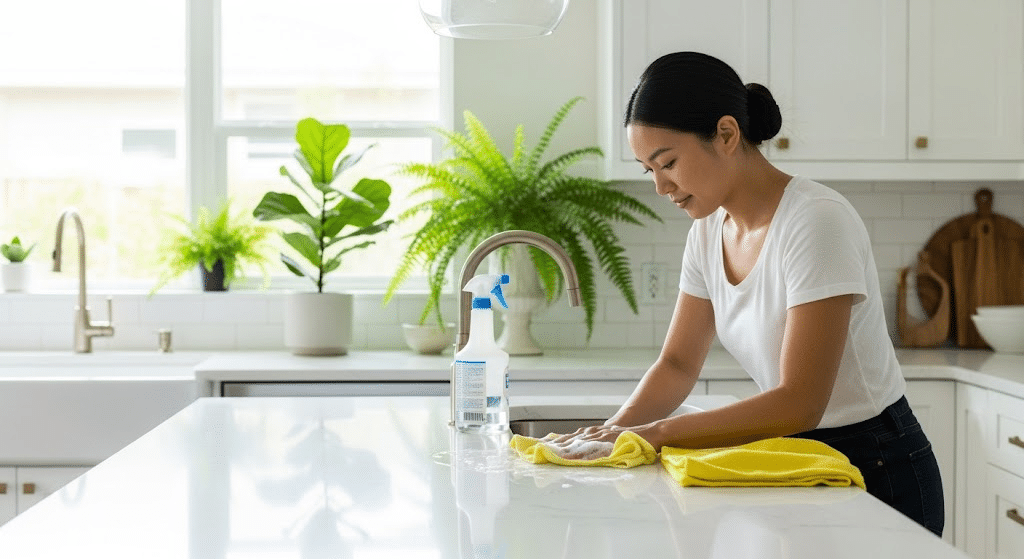
Taking proper care of your non-porous countertops is simple and doesn’t require special skills or expensive products. Following these easy tips will keep your surfaces looking new for many years.
- Clean spills immediately with a damp cloth.
- Use dish soap and warm water for daily cleaning.
- Avoid steel wool, abrasive pads, and harsh chemicals.
- Do weekly deep cleaning with a mild cleaner.
With this simple and straightforward routine, your non-porous countertops will stay beautiful and hygienic with minimal effort on your part.
Summing It Up
Choosing non-porous countertops is a smart investment that will make your life easier and your home more beautiful.
These surfaces offer unbeatable protection against stains, bacteria, and daily wear while requiring very little maintenance.
With options like quartz, solid surface, and stainless steel, you can find the perfect style for any budget and design preference.
The higher upfront cost pays for itself through years of easy cleaning and lasting durability.
When you’re ready to upgrade your kitchen or bathroom, non-porous countertops deliver the perfect combination of beauty, hygiene, and convenience that busy families need for everyday living.
Thinking about making the switch to non-porous countertops? Let us know your favorite material in the comments!

